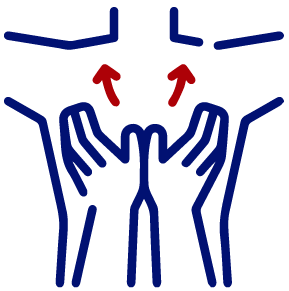
What Is Fibromyalgia?
Fibromyalgia is a chronic disorder characterized by widespread musculoskeletal pain, often accompanied by fatigue, sleep disturbances, and a variety of other symptoms. While the exact cause remains elusive, it is believed to involve abnormalities in the central nervous system’s processing of pain signals.
What Are The Symptoms Of Fibromyalgia?
Identifying symptoms related to fibromyalgia is essential for understanding and addressing underlying issues. Here’s an overview of common indicators associated with this condition:

Widespread Musculoskeletal Pain
Persistent pain throughout the body is often characterized by tender points in specific areas.

Fatigue
Profound tiredness and reduced energy levels is often accompanied by unrefreshing sleep.

Sleep Disturbances
Insomnia, frequent awakenings, and other sleep problems contribute to overall fatigue.

Cognitive Issues (Fibro Fog)
Memory problems, difficulty concentrating, and mental confusion.

Mood Disorders
Depression, anxiety, and mood swings are common in individuals with fibromyalgia.

Headaches
Frequent tension-type or migraine headaches may occur.

Irritable Bowel Syndrome (IBS)
Digestive issues such as abdominal pain, bloating, and altered bowel habits.

Sensitivity to Stimuli
Hypersensitivity to light, noise, temperature, and touch.
Causes And Risk Factors
While the exact cause is unknown, several factors may contribute to fibromyalgia, including genetic predisposition, infections, trauma, and central nervous system abnormalities. Risk factors include gender (more common in women), family history, and certain comorbid conditions like rheumatoid arthritis and lupus.
What Are The Causes?
Fibromyalgia is often triggered by an event that causes bodily damage, such as physical trauma, surgery, infection or significant psychological stress. In other cases, symptoms gradually accumulate over time with no single triggering event.
What Are The Risk Factors?
- Age: The risk of developing fibromyalgia tends to increase with age, and it is most commonly diagnosed in adults between the ages of 30 and 60. However, it can also affect younger individuals, including adolescents.
- Lupus Or Rheumatoid Arthritis: Autoimmune disorders, where the immune system mistakenly attacks healthy tissues, may be linked to fibromyalgia. The coexistence of fibromyalgia with conditions like lupus or rheumatoid arthritis is not uncommon.
- Sex: Women are more likely to be diagnosed with fibromyalgia than men. Hormonal and genetic factors may contribute to this gender difference.
- Stressful Or Traumatic Events: Traumatic events, whether physical or emotional, can trigger or exacerbate fibromyalgia symptoms. Chronic stress may also contribute to the development of the condition.
- Repetitive Injuries: Continuous strain or injuries, especially those affecting the musculoskeletal system, may contribute to the development or worsening of fibromyalgia symptoms.
- Illness (Such As Viral Infections): In some cases, infections, particularly viral infections, have been associated with the development of fibromyalgia. The exact relationship between these factors is an area of ongoing research.
- Family History: Genetic factors play a role in fibromyalgia, and individuals with a family history of the condition may be more susceptible.
- Obesity: Being overweight or obese is associated with an increased risk of fibromyalgia, and excess weight may contribute to the severity of symptoms. Weight management is often considered as part of the overall treatment plan.
How Is Fibromyalgia Diagnosed?
Identifying the root cause of fibromyalgia symptoms is vital for effective treatment. Medical assessments are key, and here are a few tests to start the diagnostic process:
Clinical Assessment: Healthcare providers evaluate symptoms, medical history, and perform a physical examination, including checking for tender points and the extent of widespread pain.
Fibromyalgia Tender Points: Specific anatomical points that are exceptionally sensitive to pressure.
Functional MRI: It is a specialized type of MRI that measures and maps brain activity by detecting changes in blood flow. Function MRI focuses on the functional aspects of the brain, showing areas that are active during specific tasks or in response to stimuli.

How Can We Treat Fibromyalgia
We, at Highlands Family Chiropractic, offer various treatment options to help you overcome the pain caused by fibromyalgia.
Schedule Your Appointment Today
Contact us today to book a free 15-minute consultation with our Chiropractor in Highlands Ranch! We look forward to getting you on the path to optimal health and wellness.






